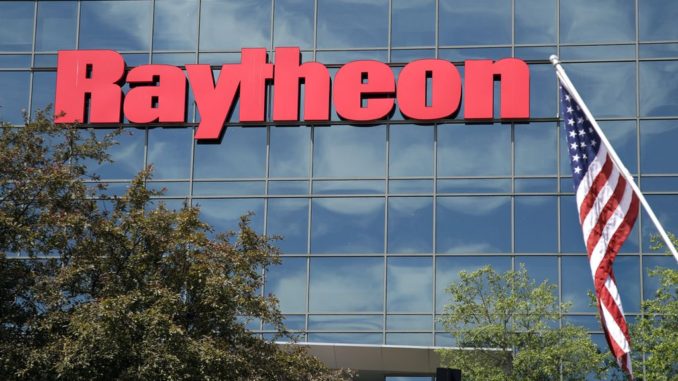
From the Boston Globe on January 3, 2022
Last January, as large swaths of the country rushed to denounce the insurrection, Raytheon and other corporations said they would pause political donations to lawmakers so they could chart a way forward in an upended political world.
But a new report shows the Waltham defense juggernaut later resumed donations to federal lawmakers who refused to certify President Biden’s election, drawing rebuke and casting doubt on the firm’s commitment to democratic ideals.
In a report released Monday by the nonprofit watchdog group Accountable.US, analysts found Raytheon gave $186,000 in political action committee contributions to 62 members of Congress who had voted against certifying Biden’s election. That vote came amid a pro-Trump mob storming the US Capitol in Washington on Jan. 6, ransacking the building and ultimately leaving five people dead and at least 138 police officers injured.
The donations, made between June and November of last year, followed a pledge Raytheon made days after the insurrection to pause all political action committee contributions to lawmakers so it could “reflect on the current environment and determine appropriate next steps.”
Kyle Herrig, president of Accountable.US, denounced the resumption of donations. “Major corporations like Raytheon were quick to condemn the insurrection and tout their support for democracy,” he said. “And almost as quickly, many ditched those purported values by cutting big checks to the very politicians that helped instigate the failed coup attempt.”
Raytheon did not respond to a request for comment.
In the wake of the insurrection, a handful of large employers in New England, including General Electric, State Street, Liberty Mutual, and CVS Health, made statements similar to Raytheon’s, vowing to rethink their political contributions. While some have maintained their suspension of contributions, others have resumed donations, separate data from Accountable.US shows MassMutual, the Springfield life insurance company, donated $5,000 in PAC money to lawmakers who voted to not certify the election, after saying last January it had “suspended contributions to any candidate who voted against the certification of the 2020 Presidential election results for any state.” And Boston Scientific, the Marlborough medical device manufacturer, gave $3,500 after saying it would “temporarily suspend” PAC activity.
Meanwhile, Boston’s G.E. asked for $2,000 in donations back, including $1,000 each from Representative Elise Stefanik of New York and Representative Garret Graves of Louisiana, both of whom voted to not certify the presidential election. (The money was returned in April.)
Overall, during the first quarter of 2021, donations to election objectors subsided, the report found. Shortly after, they picked up again. In the second quarter and third quarter of the year, PAC donations reached nearly $3 million, data showed. Data is still being analyzed for the fourth quarter, but the analysts predict it will be “the largest quarter of the year.” In total, major corporations and trade groups donated over $8 million to election objectors, the report found.
Herrig said the action is emblematic of corporate America’s tepid commitment to democratic ideals.
“These companies were never committed to standing up for democracy in the first place,” he said. “These CEOs would rather amass political influence than stand up for their customers, shareholders, and employees.”
The group analyzed 20 Fortune 500 companies and industry trade groups that reversed their stance on political donations in the wake of Jan. 6. Raytheon, one of the largest employers in Massachusetts, ranked as the fourth-highest donor to GOP lawmakers who voted to not certify the election, behind the American Bankers Association, Boeing, and the Credit Union National Association. Lockheed Martin ranked fifth. (Raytheon is the highest lobbying spender in the defense industry, according to OpenSecrets.)
In analyzing Raytheon’s Federal Election Commission filings, analysts at Accountable.US found the company spread $186,000 in donations among 62 Republican lawmakers. The lawmakers who received the most PAC money: Representative Ken Calvert of California, who received $8,000; Representative Doug Lamborn of Colorado, who took in $6,500; and Representative Hal Rogers of Kentucky, who got $6,000. (Each of the lawmakers served on either the Appropriations or Armed Services committees in the House of Representatives.)
Raytheon’s donations came as it navigated a change in the political environment that could impact its fortunes.
The company had a cozy relationship with the administration of former president Donald Trump and unparalleled access to some of his top advisers, news reports showed. Some observers thought it would suffer under the Biden administration, but its lobbying efforts, a large payroll of former Department of Defense officials, and Biden’s pivot from the Middle East to China have helped Raytheon retain its edge as the country’s second-largest defense manufacturer, industry experts and activists said.
Paul Shannon, an organizer for Massachusetts Peace Action, a group that advocates against Raytheon, said he is not surprised the defense company has resumed donations to lawmakers willing to defy democratic principles and deny the results of an election. It simply shows the type of representatives the company relies on to wield power in Washington, he said, adding that any blowback the company might face will likely be limited.
“They are so arrogant and bold,” he said. “They know they control the levers of power. They know they can withstand this.”
